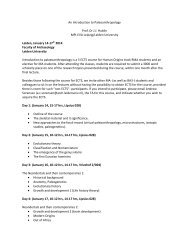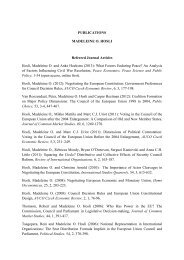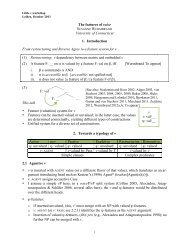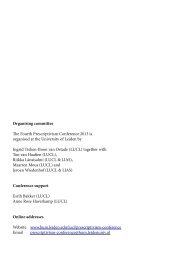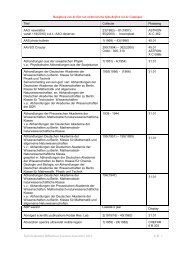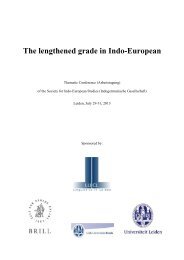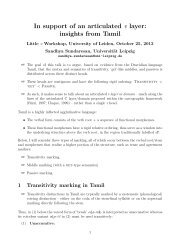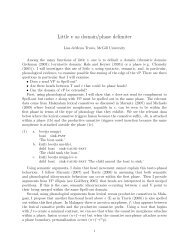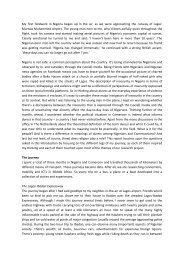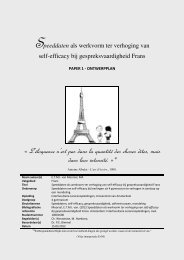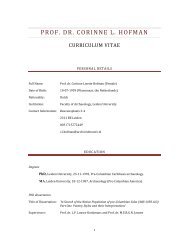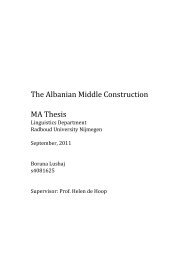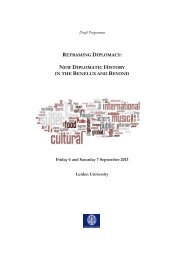Institute for History Annual Report 2010 - O - Universiteit Leiden
Institute for History Annual Report 2010 - O - Universiteit Leiden
Institute for History Annual Report 2010 - O - Universiteit Leiden
Create successful ePaper yourself
Turn your PDF publications into a flip-book with our unique Google optimized e-Paper software.
oundary as to what is morally acceptable. Outmarrying<br />
women are accused of adultery, where<br />
the betrayed party is not a (potential) husband, but<br />
the group she is felt to belong to. Out-marrying<br />
women are seen as being lost to their original<br />
community, whereas out-marrying men are not.<br />
Women are seen as objects of loss and gain,<br />
whereas men are seen as conquerors. Families and<br />
ethnic groups feel they need to be protected<br />
against this kind of ‘losses’. At the same time,<br />
however, women could generally more easily<br />
acquire a new nationality through marriage than<br />
men could. Marriages of women outside their<br />
primordial group are also seen as a threat to the<br />
group. After marriage, women are no longer<br />
considered to belong to their original ‘group’<br />
emotionally (and often also juridically). Secondly,<br />
in the discussions on gender and migration Susan<br />
Okin’s article ‘Is multiculturalism bad <strong>for</strong><br />
women?’ has played an important role. It has led<br />
to studies and debates on the extent to which the<br />
so-called multi-cultural policies, which many<br />
countries followed since the 1970s, were bad <strong>for</strong><br />
women. This policy ‘allowed’ immigrants to be<br />
different. A debate has erupted over how this<br />
policy has created, stressed and maintained differences<br />
between immigrant men and women. As<br />
part of this policy frequent reference was made to<br />
family, portraying all immigrant women as wives<br />
and mothers. Defences <strong>for</strong> certain practices (such<br />
as honour killings or <strong>for</strong>ced marriages) were based<br />
on tradition. Immigrants were granted group<br />
rights, which were different from those of nonmigrants,<br />
but which were usually bad <strong>for</strong><br />
<strong>Institute</strong> <strong>for</strong> <strong>History</strong><br />
131<br />
immigrant women (and profitable <strong>for</strong> men). This<br />
multi-cultural policy is considered to have been<br />
bad <strong>for</strong> immigrant women since stress on cultural<br />
difference and traditional values often implied restricted<br />
rights <strong>for</strong> women. Furthermore, because<br />
they were seen as backward and traditional (especially<br />
when they came from Islamic countries),<br />
policy makers <strong>for</strong> a long time thought it best to<br />
reach immigrant women via men.<br />
In the third place, one of the most important issues<br />
in the discussion on gender and migration is the<br />
trafficking of women. It is as trafficked women<br />
that women migrants gain a high visibility in<br />
academic, public and political discourse. Men are<br />
more often regarded as being smuggled, women<br />
as being trafficked. The definition of trafficking<br />
emphasises that people are transferred against<br />
their will, while the definition of smuggling not<br />
only implies consent but also payments. In<br />
debates, trafficking is often used as a synonym <strong>for</strong><br />
prostitution. The gendered discourse about abuse<br />
is applied to women only. The assumption that<br />
women are more often trafficked leads to a<br />
stronger monitoring of migrant women, as<br />
opposed to men. It also leads to all migrant<br />
women being portrayed as (potential) victims of<br />
rape and other sexual harassment. Although<br />
differences between migrant men and women<br />
have been noted, they have not been described<br />
systematically over an extended period of time.<br />
Several authors have stressed the need <strong>for</strong> such an<br />
approach and <strong>for</strong> more research on migration from<br />
a gender perspective. The hypothesis underlying<br />
our research is that some of the differences can be




